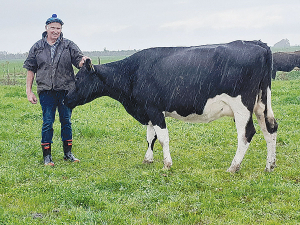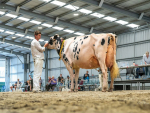Not only did he relocate to New Zealand with his parents as a child, but the challenging land on which his farm was established led to the creation of a soil management method that was named after his family.
Alex emigrated from Scotland in May 1963 with parents Fred and Jean, and brother Tom.
“My parents owned a small farm in Scotland, but Dad had an uncle in New Zealand so that’s where the attraction to emigrate lay,” Alex says.
They moved to Westport in 1969, with Fred working as a Ministry of Agriculture inspector.
Alex attended Lincoln College in 1972, but after 18 months of studying for a Bachelor of Agricultural Science he decided it wasn’t for him. He returned to Westport and did contract gorse spraying for Land & Survey, fencing in winter, and a little bit of shearing.
Brother Tom joined Alex in 1974 to establish the King Brothers farm business. They leased an ex-town supply farm on the outskirts of Westport and started dairy farming in 1975.
They started with a crossbred herd, buying their first purebred Holstein Friesian heifer in March 1976 from Nelson and Jan Cook’s Westland Stud. They bought 13 animals in total at the first sale, mostly by the bull Spreydon Lodge Kerk.
“They were good producers,” Alex says. “We went on to buy more heifers each year to top up our replacements, buying 60 in total.”
The herd was improved following the introduction of the Cooks’ bloodlines that Nelson was generous enough to share, Alex says.
“I really appreciate Nelson’s keenness to share his knowledge, and we’ve become good friends over the years,” he says. “He has been an inspiration and a mentor.”
In 1984 Alex went into the ballot system for farms at Cape Foulwind on the West Coast. The original plan for the Cape was for 48 dairy units, milking 135 cows each.
“Unfortunately, due to Rogernomics the first year of ballots was the last,” Alex says. “But I got an 111ha farm, which was the original trial farm on which they planned to see if dairying was viable on the Cape.”
The farm hasn’t been without its challenges. The heavy pakihi soil – which has a solid iron pan between 300mm and 1m below the surface – became very wet in winter as it got waterlogged and could not drain away.
“In some areas we were able to push posts in by hand,” Alex says. “Humping and hollowing the land seemed to help, but it did depend on the soil and gravel types.”
In 1990 the family was undertaking digger work on farm when Fred suggested they dig deeper to see what was underneath. The resulting method of flipping the soil was later renamed the ‘King Flip’ after the family.
Flipping the soil involves digging the soil to a depth of 1-4m, partly inverting and mixing it and breaking up the iron pan to improve drainage and fertility.
Alex says with no aerial topdressing, ground spreading became the norm and wintering cows on was a plus.
“The organic matter built up over the years, but some areas had to be reflipped as they weren’t flipped deep enough early on,” he says.
Ducks Starting To Line Up
Mating of the milking herd starts with four-and-a-half weeks of AI, before tailing with Hereford bulls, which they have done for the last 12 years.
Alex trained with Ambreed in 1981 and still AIs the larger herd himself.
The Kings breed their own bulls, using Hereford yearling heifers from Lake Station. The bulls go with the dairy heifers to the grazier.
The heifers are run with high BW Jersey bulls, from which they keep 15 calves.
With fertility and somatic cell count (SCC) the main drivers, Alex says the “ducks are starting to line up”.
“Last season, the small herd had a seven percent empty rate, and the larger herd had an 11 percent empty rate, at 10.5 weeks,” he says.
The breeding of the Garvocklea herd has been made up of many careful decisions over the years. The herd’s genetics have a strong foundation, starting with the use of Nelson Cook’s bloodlines back in the 1970s.
Alex bred his first VG-classified cow in the late 1980s, Garvocklea A F Rose.
“Her dam came from Nelson Cook and her sire was Athol Sovereign Fame,” he says.
Following an inspirational talk from the 1988 Holstein Friesian NZ Blenheim conference keynote speaker, Alex started using a son of Puget-Sound Sheik - Kauri Ridge Sheik Calypso - and Athol Fame Prefect.
“We wanted functional type cows, and because the pakihi soil was daunting in the early years we decided to breed a lighter cow,” Alex says. “Hence the use of the Pukeroro bulls for the first five years.”
Alex also used one of Gordon Stewart’s (Cresslands Holstein Friesians) Pukeroro-bred bulls over Garvocklea A F Rose, from which he got a heifer calf that became Tobias’ calf club calf.
They have also started using World Wide Sires outcross genetics to see how overseas genetics may fit into their farm system.
“With the Jersey genetics we used way back then, it is fair to say that nearly half the herd carries some Jersey blood,” Alex says. “But Holstein Friesian genetics keeps the udders correct.”
Alex was a member of Holstein Friesian NZ in the early 1990s, but registration of cattle fell away as “we weren’t selling surplus stock”.
However, with daughter-in-law Christie being an AI technician and keen on genetics, they ended up classifying 110 cows in the 2021/22 season. To their surprise and delight, they gained two EX and 40 VG classifications.
“It has sparked even more interest,” Alex says.
"I am still a stalwart of the Holstein Friesian breed."
Farm Facts
- Owners: King Family
- Location: Cape Foulwind, West Coast
- Farm size: 246ha effective over two farms
- Cows: 495 (80 registered Holstein Friesian) over both farms
- Production: 200,000 kgMS
- Stud name: Garvocklea


















